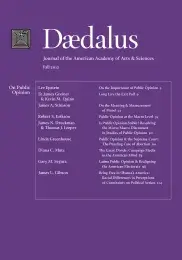Being Free in Obama’s America: Racial Differences in Perceptions of Contraints on Political Action
Many studies of interracial differences in rates of political participation pay too little attention to African Americans' perceptions of whether they can freely participate in politics. Survey evidence collected over the last several decades has consistently shown that black Americans perceive much less political freedom available to them than do white Americans. The gap in perceived freedom has narrowed somewhat in recent years but remains large. Following the empowerment hypothesis of Lawrence Bobo and Franklin Gilliam, black perceptions of freedom increased with the election of Barack Obama to the American presidency. But perhaps unexpectedly, the empowerment bonus has not persisted, especially among conservative and fundamentalist blacks. Because African Americans do not perceive that their government would permit various types of political action, it is likely that substantial interracial differences exist in non-voting types of political participation, especially political action directed against governmental authority.
